Meeting OA Publishing & Data Policy Requirements
Mike Nason | Scholarly Communications and Publishing Librarian, UNB Libraries (For ORS, Spring 2022/3)
The Tri-Agency Open Access Policy on Publications
Policy .1
“Grant recipients are required to ensure that any peer-reviewed journal publications arising from Agency-supported research are freely accessible within 12 months of publication.”
Policy .2
“Grant recipients can publish in a journal that offers immediate open access or that offers open access on its website within 12 months.”
Policy .3
“Grant recipients can deposit their final, peer-reviewed manuscript [post-print] into an institutional or disciplinary repository that will make the manuscript freely accessible within 12 months of publication.”
Preprints don't count.
But, they are definitely better than nothing.
And you may ask yourself,
why is this a thing?
Simply put, public money funds your research.
That same public should not have to pay a second time to access the products of that funded research.
Implications
Depending on your discipline, this might not be problematic at all.
Depending on your discipline, this might not be problematic at all be incredibly frustrating.
Regarding Publishers
✓
Some publishers are fully open access. If you publish in open access journals, you are already meeting your criteria.
This is similarly true if the journal you publish in offers delayed open access for material after 12 months.
✓
I am very well aware that...
Not all disciplines have reputable or high-quality open access journals to turn to.
And so... 💸
Most major journal publishers allow for an article to be made open access by payment of an Author Processing Charge (APC). This can cost as much as $3000 USD.
This is referred to as “hybrid publishing” via “gold open access”.
---
It is worth noting that “hybrid journals” collect APCs on top of their existing subscription fees.
There are workarounds!
Helping you with this is very literally my job.
🙌
Most major journal publishers allow for an accepted manuscript to be deposited in an open access repository within 12 months of publication as per government mandate.
This is green open access.
Publishers do not typically provide an accepted manuscript after publication.
You usually have to have held on to the version of the document post-peer review and before copyediting.
🤔
No matter what you decide to do with your work, it is a good idea to save (and label) your accepted manuscripts and preprints. Just in case!
Actually, let's take a minute to talk about article versions.
Pre-
- Author's Original
- Submitted Manuscript
- Submitted Manuscript Under Review
These are, generally, referred to as "preprints".
Post-
- Accepted Manuscript
- Proof
- Version of Record
- Corrected VoR
- Enhanced VoR
These are all the versions after peer review.
Also, before we move on...
The OA discourse has really changed in the last few years!
Where can I...
put
dump
share
my work?
Repositories
A word that means something.
Policy .4
If your work is not published in an open access venue, you are required to share it in an open access repository, be it “institutional” or “disciplinary”.
They aren't...
- a faculty webpage
- your personal webpage
- researchgate
- academia.edu
- social media
- an accessible web directory on a server somewhere
- for profit
They are...
- managed by professionals
- often open source and community-developed
- often hosted by academic institutions
- feature-rich software stacks
- focused on indexing, access, and digital preservation
UNB Scholar
UNB Libraries hosts an institutional repository called UNB Scholar. It houses many forms of scholarship from the UNB community.
A copy of your accepted manuscrupt in UNB Scholar will meet your open access criteria.
If you choose to house your preprints or accepted manuscripts in UNB Scholar, you can send them directly to me (mnason@unb.ca) or contact the liaison librarian assigned to your department/faculty.
Alternatives
A disciplinary repository typically represents the works of a community of practice.
Arxiv.org, for example, is a popular (primarily preprint) hosting space for physics, math, and statistics researchers.
A convenient list of some disciplinary repositories can be found here:
Academia.edu and ResearchGate are not considered “open repositories”.
These services are provided by venture-capital-backed for-profit companies and are, essentially, “academic Facebook”.
While they serve a purpose in sharing your scholarly profile and connecting researchers, these services are under no requirement to preserve or provide access to your files. Their license agreements allow them to use your data as they see fit, and terminate access at their discretion.
By all means, share your works in these services if you like. But, please, be aware that you may still only share versions as stipulated by your publishers. Full publisher PDFs of paywalled content, shared in these ways, has led to hefty lawsuits from certain publishers. You assume risk.
What can I share?
Publishers and Policies
Publishers almost always list their policies somewhere on their website. Some are very upfront with them. Some bury this information in nests of obtuse menus.
The database (with an admittedly insane name), SHERPA/RoMEO, is a collection of publisher and journal policies.


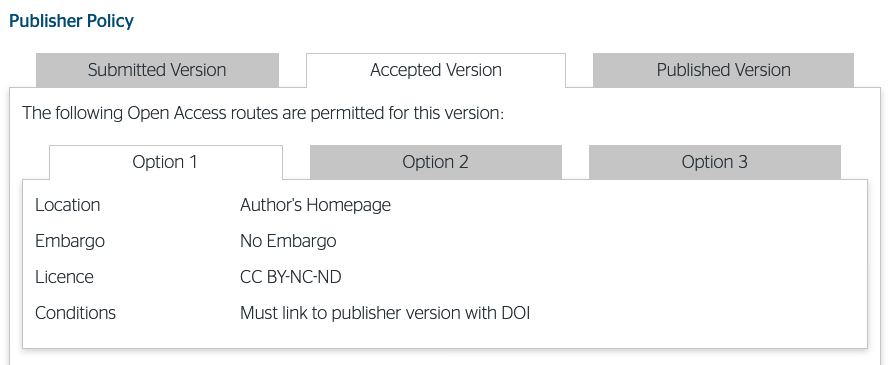
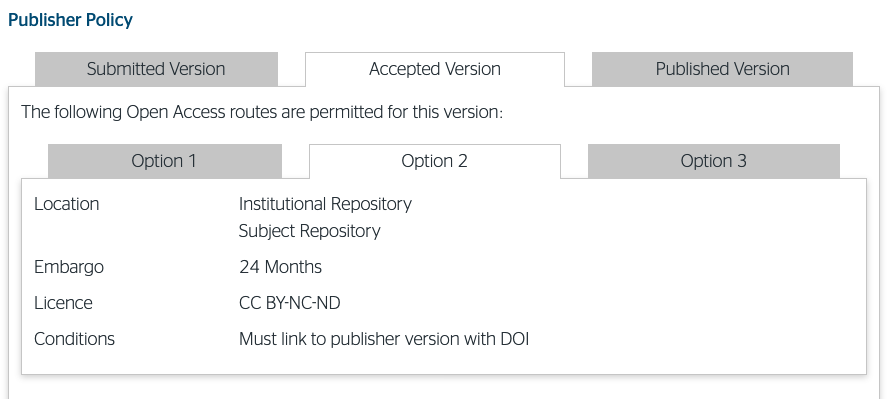
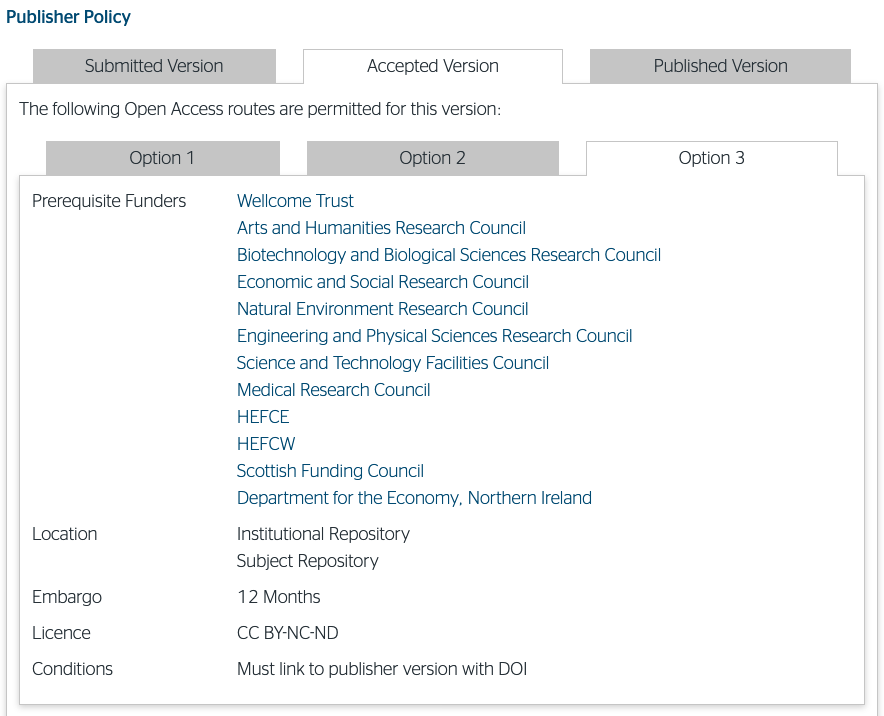
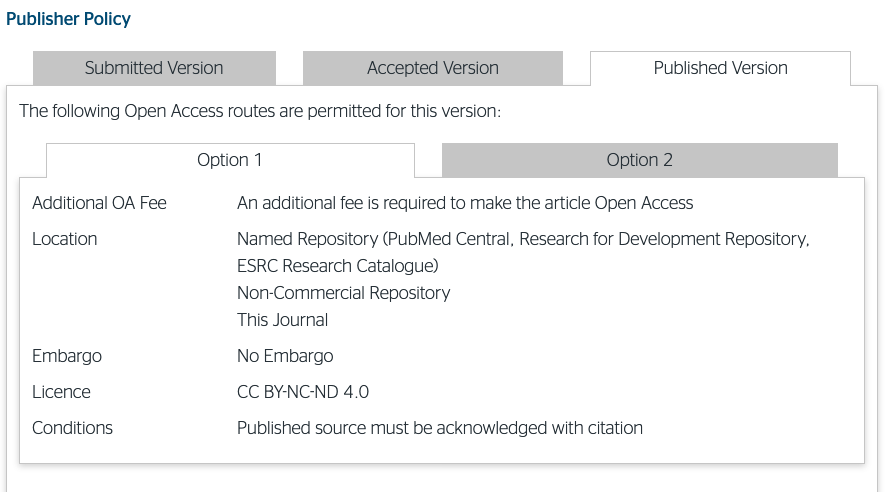

If your rights are ever ambiguous or if a journal’s policy is missing from SHERPA/RoMEO, we can help! Please contact me (mnason@unb.ca) or the copyright office at UNB Libraries (copyright@unb.ca) for assistance.
What if accepted manuscripts aren't an option for me?
APCs
If the journal you want to publish in has no postprint options but does allow for open access via APC, you can apply for that funding in your grant.
🇨🇦
The Tri-Agency has stated that this is an appropriate cost to fund.
If you have no choice...
we might be able to save you some money on those APCs.
Library APC Discounts
UNB Libraries, through a consortial body known as CRKN (Canadian Research Knowledge Network), negotiates "transformative agreements" with publishers.
These agreements offset APC fees for some publishers. You can see more information here:
Contact ORS
Your contact at the Office of Research Services can help you add publication costs to your funding application.
🎓
Publishers typically list APC information on their websites. If they don’t, there is a distinct possibility that the publisher is operating in bad faith.
What if my publisher has no open access options?
¯\_(ツ)_/¯
You could try...
-
contacting the publisher to ask about exceptions
-
putting pressure on the publisher to support authors under mandate
-
publishing elsewhere
What if I hate those ideas?
(╯°□°)╯︵ ┻━┻
You could try...
Having a frank conversation with your dean or the union about whether or not the tenure and promotion process properly addresses the realities, pressures, and evolution of modern publishing practices.

Illustration by Max Fleischman. Featured on The Daily Dot, accessed May 8, 2020.
One policy down...
The Tri-Agency Research Data Management Policy
Please do not panic...
the libraries are quite prepared to help you.
Policy Objectives
Whereas the goal of the OA Publishing Policy was to make content available to the public, the goal for the RDM policy is quite different.
"The objective of this policy is to support Canadian research excellence by promoting sound RDM and data stewardship practices. This policy is not an open data policy."
Deployment in three stages...
things are only really just getting started.
Institutional Strategy
Implementation:
~March, 2023.
Institutional Strategy
"Each postsecondary institution and research hospital eligible to administer CIHR, NSERC or SSHRC funds is required to create a publicly-available institutional RDM strategy and notify the agencies when it has been completed."
- data as research output
- support for researchers in ethical, legal, and commercial obligations
- promoting rdm and data management plans (dmp)
- guidance and best practices
Institutional Strategy
- providing repository platforms and service
- acknowledgement, affirmation, and implementation of knowledge sharing distinctions when dealing with First Nations, Métis and Inuit communities
Implementation:
March, 2023
Mostly, I just want you to know that this policy is still under development at UNB at the moment.
Data Management Plans
Implementation:
~Spring 2022
Data Management Plans
"All grant proposals submitted to the agencies should include methodologies that reflect best practices in RDM."
"For certain funding opportunities, the agencies will require data management plans (DMPs) to be submitted to the appropriate agency at the time of application, as outlined in the call for proposals."
Data Management Plans
"DMPs are living documents that can be modified to accommodate changes throughout the course of a research project."
- how data is collected, documented, formatted, protected, and preserved
- how datasets will be used
- whether/how data will be shared
- where data will be deposited
Data Management Plans
- responsibilities
- succession plans
- ethical, legal, or commercial restraints
- methodological considerations
Implementation:
Spring 2022
Data Management Plans
So far, this isn't yet fully implemented and you'll know if it is a requirement for the grant you're applying for.
Implementation:
Spring 2022?
However,
You will have to do Data Management Plans sooner than later. This is an excellent time to try to include one in your grant application.
At best, you'll strengthen your application. At worst, you'll know what is involved in the process so it is more familiar next time.
A Data Management Plan is not too complicated.
I have so many resources for you.
The DMP Assistant
Provided by the Digital Research Alliance of Canada (formerly Portage)
link | https://assistant.portagenetwork.ca/
This is the place. This is the most important.
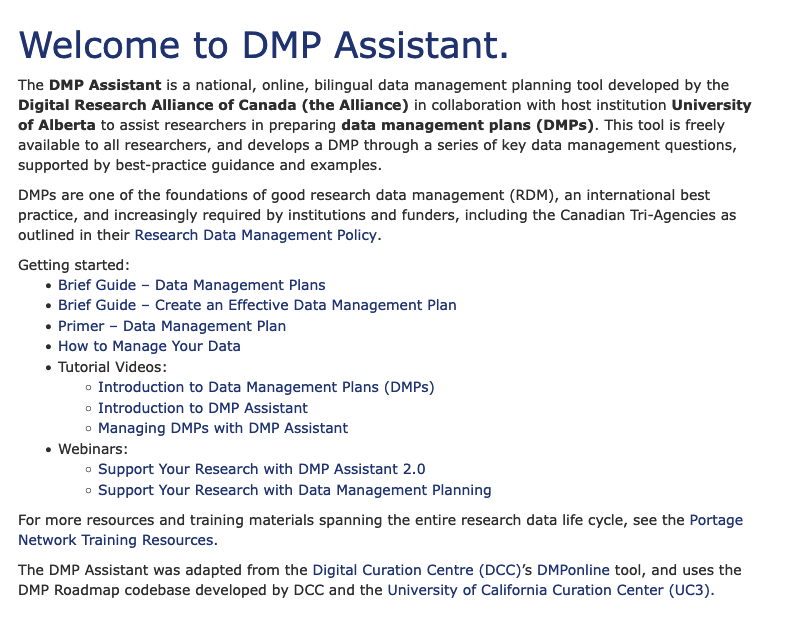
UNB Libraries RDM Services
lib.unb.ca/rdm
Data Management Planning
lib.unb.ca/rdm/data-management-planning
Contact
rdm.services@unb.ca
Data Deposit
Implementation:
Contingent on Institutional Strategy Review
Data Deposit
"Grant recipients are required to deposit into a digital repository all digital research data, metadata and code that directly support the research conclusions in journal publications and pre-prints that arise from agency-supported research.
Determining what counts as relevant research data, and which data should be preserved, is often highly contextual and should be guided by disciplinary norms."
Data Deposit
- deposit must be made by time of publication
- grant recipients are not required to share their data, but
- the agencies expect researchers to provide appropriate access to the data where appropriate...
Implementation:
This won't be implemented until the Tri-Agencies have reviewed institutional strategies.
They will then "phase-in" deposit requirements.
Parting Words
I can help...
- save your research money for research.
- interpret publisher/journal policies.
- submit your content to UNB Scholar.
- make a dmp
- submit to dataverse
- help you find disciplinary repositories.
- help you with research data management.
- evaluate past publications for OA potential.
Please remember to...
- save your accepted manuscripts.
- where possible, check policies for prospective journals before submitting your grant application.
- if you’re seeking new journals, please apply significant scrutiny.
- follow publisher/journal policies.